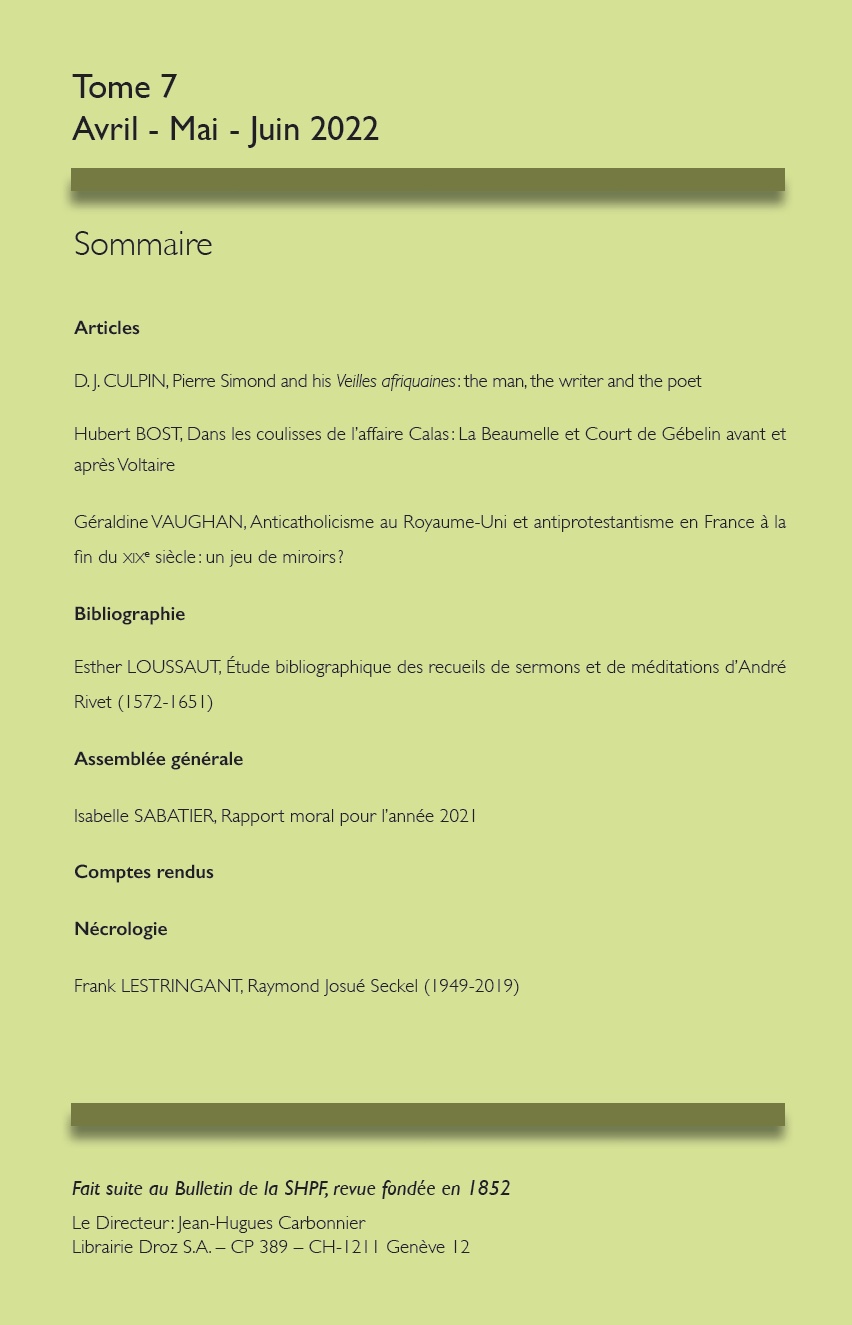Dans les coulisses de l’affaire Calas
La Beaumelle et Court de Gébelin avant et après Voltaire
Abstract
Although the Calas affair owes its fame to the efforts of Voltaire, the involvement of two Protestant humanists is also deserving of attention. The writer La Beaumelle, who was living at Toulouse when Marc-Antoine Calas was found dead (13 October 1761), immediately drafted several texts. These included La Calomnie confondue, commonly attributed to the pastor Paul Rabaut, and the Observations pour le sieur Jean Calas, which are signed Duroux. Then, after Calas’s brother Jean was condemned to death for allegedly murdering his brother (9 March 1762), he also wrote a memoir “to the king” in which he first reviewed the facts, and then submitted twelve grounds of invalidity against the instruction of the capitoul (i.e., chief magistrate) David de Beaudrigue. This memoir was also read by the defenders of Calas’s memory, in particular Voltaire and Court de Gébelin, who would be inspired by its tenor. Finally, at the rehabilitation of Calas (1765), La Beaumelle sought to convince Anne-Rose Cabibel-Calas to indict not only David de Beaudrigue and the capitouls, but also the criminal chamber of the Toulouse parliament itself. Court de Gébelin took an interest in the Calas affair from Lausanne. In 1762 he was first appalled by the execution of his former student François Rochette, and then dismayed at the sufferings of Pierre-Paul Sirven who, like Calas, was convicted of killing his child, making every effort to welcome Sirven on the shores of Lake of Geneva. Court de Gébelin’s Toulousaines constitute a collection of fictive letters in which he interwove accounts of the affairs of Rochette, Calas, and Sirven in order to unveil the anti-Protestant fanaticism exercised by the capital of Haute-Languedoc. Notwithstanding their undeniably militant nature, the Toulousaines still show a real concern for objectivity in their account of the affairs, as Court de Gébelin exerted all efforts to collect the most trustworthy testimonies. La Beaumelle opted to publish anonymously out of his fear for his safety and in the hope that his writings might be more effective. Court de Gébelin did publish his Toulousaines under his name, but their dissemination was limited by the hostility of Lausanne and Geneva, and later also by Voltaire who was preparing his own Traité sur la tolerance. Even though the writings of these two men never gained much attention, they deserve to be studied and represent significant contributions from French Protestantism in the latter half of the eighteenth century. One can only guess at the destiny that would have met this Protestantism if other tactical choices had been made by those who, in France as well as the Refuge, claimed that they were making their decisions to its best interest.
Keywords
Calas Affair, La Beaumelle, Court de Gébelin, Paul Rabaut, Voltaire
How to Cite
More Citation Formats
Most read articles by the same author(s)
- Hubert Bost, Un point sur l’édition de La Correspondance générale de La Beaumelle, Revue d'histoire du protestantisme: Vol. 2 n° 1-2 (2017): Le Luther des Français
- Hubert Bost, Bayle et les reliques, Revue d'histoire du protestantisme: Vol. 1 n° 3 (2016): Varia
- Hubert Bost, Organiser la résistance des Églises du Désert : l’assemblée des Montèzes, août 1715, Revue d'histoire du protestantisme: Vol. 1 n° 2 (2016): Varia

